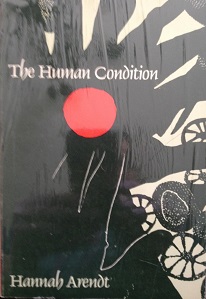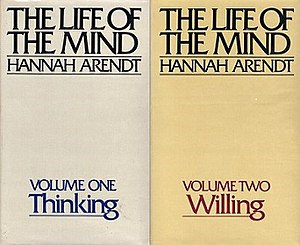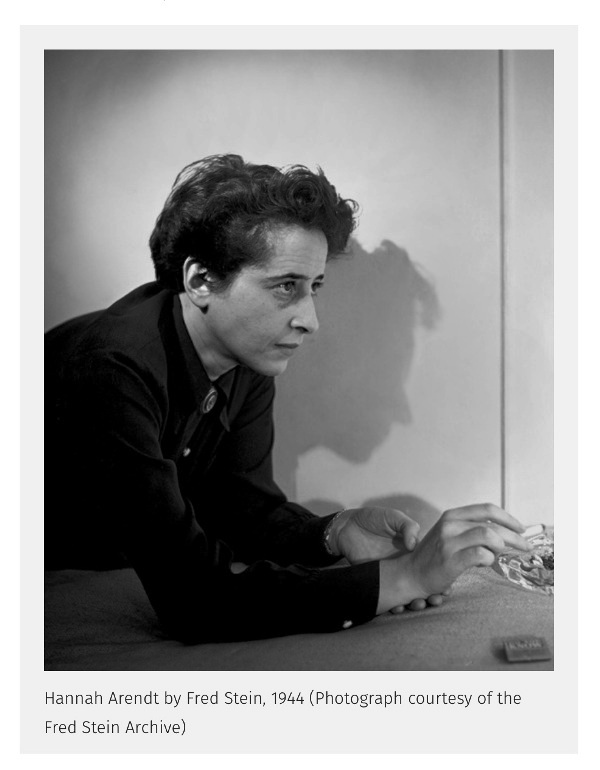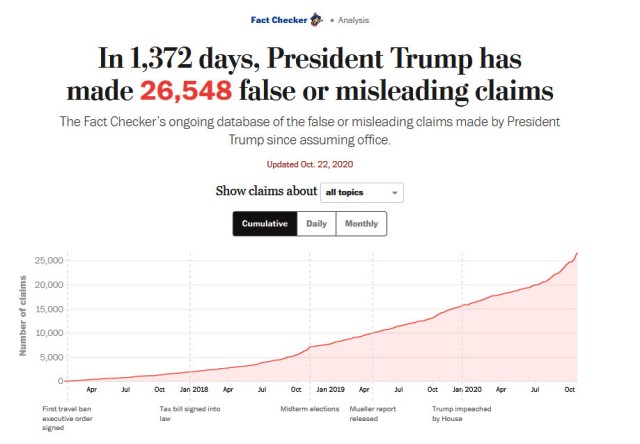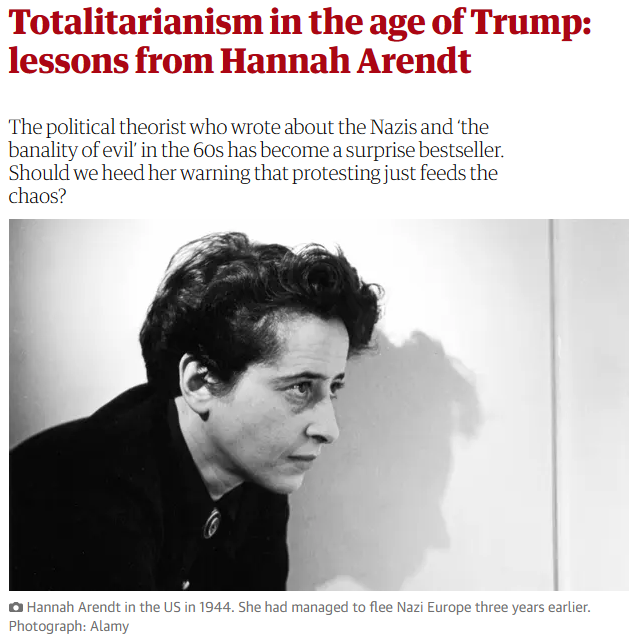File:Hannah Arendt.jpg: Difference between revisions
Siterunner (talk | contribs) No edit summary |
Siterunner (talk | contribs) No edit summary |
||
| (One intermediate revision by the same user not shown) | |||
| Line 135: | Line 135: | ||
Consider the words that are interspersed with totalitarianism... | Consider the words that are interspersed with totalitarianism... | ||
Autocracy/autocratic, Fascist/fascistic, Kleptocracy/kleptocratic, Oligarchy/oligarchic, Authoritarianism/authoritarian, Antidemocracy/antidemocratic ... | Autocracy/autocratic, Fascist/fascistic, Kleptocracy/kleptocratic, Oligarchy/oligarchic, Plutocracy/plutocratic, Authoritarianism/authoritarian, Antidemocracy/antidemocratic ... | ||
Arendt makes a distinction between totalitarianism and despotism, tyranny, dictatorship... totalitarianism is more extreme | Arendt makes a distinction between totalitarianism and despotism, tyranny, dictatorship... totalitarianism is more extreme. Totalitarians use terror to subjugate mass populations in addition to political enemies... | ||
Throughout all these definitions of | Throughout all these definitions of politically oppressive systems, what becomes evident on investigation is how information is controlled and manipulated... Now, in the modern era, the invention and rollout of digital high-speed communication systems has enabled voluminous communications in every community. These systems, using 'political technology', are reaching, watching, listening, and interacting with all. | ||
Authoritarian regimes are adopting these new technologies (software/firmware/hardware). | Authoritarian regimes are rapidly adopting these new technologies (software/firmware/hardware) and implementing surveillance techniques. These systems are collecting and monitoring mass populations and providing databanks with precise information. | ||
The 20th century propagandists of oppressive political systems can be seen as rolling into the 21st century with powerfully increased reach and authority. Hannah Arendt would recognize these methods and be sounding a warning... to act in response to protect freedoms, rights, democratic institutions. Arendt, if her sage voice was here, would be a clarion call. Time to contemplate ('vita contemplativa') and act ('vita activa'). | |||
| Line 176: | Line 178: | ||
* https://aeon.co/essays/for-arendt-hope-in-dark-times-is-no-match-for-action | * https://aeon.co/essays/for-arendt-hope-in-dark-times-is-no-match-for-action | ||
[https://www.greenpolicy360.net/w/File:Act_now_for_a_livable_future.png <big><big>'''Act Now to Protect Our Future''']</big></big> | |||
[https://en.wikipedia.org/wiki/The_Human_Condition '''"Vita contemplativa to Vita activa"'''] | |||
Latest revision as of 04:55, 20 July 2024
Bettmann Archive
Steve Schmidt / GreenPolicy360 Siterunner: The year 1974 is a period during my 20s when I was working during the day as a book editor/exec in New York City and at night studying at the Graduate Faculty of the New School and Hannah Arendt was one of our professors and one of the reasons I chose to attend and interact intellectually with the distinguished professors. Hannah's books, especially The Human Condition, were centers of the 'History of Ideas' curriculum and her thoughts on authoritarianism and how it can take hold of a nation were memorable, powerful ideas as she spoke of the conditions in Germany leading to World War II.
Today in the United States a wave of authoritarianism, loss of credibility in news, and political extremism is bringing threats to democracy and the republic that should recall the conditions Hannah Arendt spoke of for years in her work and focused in on shortly before her death in the mid 1970s.
- Univ. of Chicago Press, 1970
Hannah Arendt is preeminently the theorist of beginnings. All her books are tales of the unexpected (whether concerned with the novel horrors of totalitarianism or the new dawn of revolution), and reflections on the human capacity to start something new pervade her thinking. When she published The Human Condition in 1958, she herself sent something unexpected out into the world, and forty years later the book's originality is as striking as ever. Belonging to no genre, it has had no successful imitators, and its style and manner remain highly idiosyncratic. Although Arendt never tried to gather disciples and found a school of thought, she has been a great educator, opening her readers' eyes to new ways of looking at the world and at human affairs.
Memorably, Hannah was writing the first page of her last book in the Life of the Mind trilogy when she passed away....
'On Totalitarianism'
Hannah Arendt - Totalitarianism begins in contempt for what you have. The second step is the notion: “Things must change—no matter how, Anything is better than what we have.” Totalitarian rulers organize this kind of mass sentiment, and by organizing it articulate it, and by articulating it make the people somehow love it. They were told before, thou shalt not kill; and they didn’t kill. Now they are told, thou shalt kill; and although they think it’s very difficult to kill, they do it because it’s now part of the code of behavior. They learn whom to kill and how to kill and how to do it together. This is the much talked about Gleichschaltung—the coordination process. You are coordinated not with the powers that be, but with your neighbor—coordinated with the majority. But instead of communicating with the other you are now glued to him. And you feel of course marvelous. Totalitarianism appeals to the very dangerous emotional needs of people who live in complete isolation and in fear of one another.
Hannah Arendt - If, everybody lies to you, if everybody always lies to you, the consequence is not that you believe the lies, but rather that nobody believes anything any longer…And a people that can no longer believe anything, cannot make up its mind. It is deprived, not only of its capacity to act, but also of its capacity to think and to judge. And with such a people, you can then do what you please.
Loss of a Free Press and 'You Get a Great Number of Lies'
The moment we no longer have a free press, anything can happen. What makes it possible for a totalitarian or any other dictatorship to rule is that people are not informed; how can you have an opinion if you are not informed? If everybody always lies to you, the consequence is not that you believe the lies, but rather that nobody believes anything any longer. This is because lies, by their very nature, have to be changed, and a lying government has constantly to rewrite its own history. On the receiving end you get not only one lie—a lie which you could go on for the rest of your days—but you get a great number of lies, depending on how the political wind blows. And a people that no longer can believe anything cannot make up its mind. It is deprived not only of its capacity to act but also of its capacity to think and to judge. And with such a people you can then do what you please.
○
October 14, 2020
Emily Haber @GermanAmbUSA
German Ambassador to the US
One of her many legacies: Totalitarianism can flourish where people systematically refuse to engage with reality, and are ready to replace reason with ideology and outright fiction.
Fact-Checking: A Necessity Amid a Modern Onslaught of Lies Enabled by Online Marketing, Paid Media, Social Media, Algorithms, Databases, Money in Politics
An onslaught of online opinion, diversions and advertising aiming for eyeballs and clicks, metrics that can be monetized are interspersed with state of the art marketing techniques pushing a breakdown of civility and common purpose.
As Hannah Arendt wrote of the loss of democracy and ascension of totalitarianism/authoritarianism in earlier times, the manipulation of the public becomes possible when facts, truth, veracity are put aside and rejected.
····································································································
GreenPolicy360:
Re: the 'Transformation of Facts Into Opinions'
- Everyone does not have a right to his ignorance under the pretext that everyone has right to his opinion
Perhaps the most striking and frightening aspect of the German flight from reality is the habit of treating facts as though they were mere opinions. For example, the question of who started the last war, by no means a hotly debated issue, is answered by a surprising variety of opinions. An otherwise quite normally intelligent woman in Southern Germany told me that the Russians had begun the war with an attack on Danzig; this is only the crudest of many examples. Nor is this transformation of facts into opinions restricted to the war question; in all fields there is a kind of gentlemen’s agreement by which everyone has a right to his ignorance under the pretext that everyone has a right to his opinion—and behind this is the tacit assumption that opinions really do not matter. This is a very serious thing, not only because it often makes discussion so hopeless (one does not ordinarily carry a reference library along everywhere), but primarily because the average German honestly believes this free-for-all, this nihilistic relativity about facts, to be the essence of democracy. In fact, of course, it is a legacy of the Nazi regime.
— Hannah Arendt, "The Aftermath of Nazi Rule — Report from Germany", Commentary, October 1950
○
GreenPolicy360 / Steven Schmidt:
Your GreenPolicy siterunner studied with the Graduate Faculty of the New School for Social Science. While I worked for years in New York publishing, I read, discussed and debated, wrote and carried on an old intellectual tradition at the university that in many ways carried on the European liberal studies tradition. Our faculty was, in many regards, academically famous and professors/authors such as Hannah Arendt and Robert Heilbroner kept my mind engaged as I read hundreds of classics over the years, including "The Wealth of Nations". Although I focused on "political economy", I ranged wide over the history of ideas.
These days I think more and more about Hannah Arendt and her lessons. Every day Hannah's work become more relevant.
Hannah Arendt's Origins of Totalitarianism stands out in our modern times.
The threats of autocracy are real and growing, with dis- and mis-information wielded, a cyberpolitics and cyberwarfare of manipulation, of big lies and big lies repeated until believed.
Consider the words that are interspersed with totalitarianism...
Autocracy/autocratic, Fascist/fascistic, Kleptocracy/kleptocratic, Oligarchy/oligarchic, Plutocracy/plutocratic, Authoritarianism/authoritarian, Antidemocracy/antidemocratic ...
Arendt makes a distinction between totalitarianism and despotism, tyranny, dictatorship... totalitarianism is more extreme. Totalitarians use terror to subjugate mass populations in addition to political enemies...
Throughout all these definitions of politically oppressive systems, what becomes evident on investigation is how information is controlled and manipulated... Now, in the modern era, the invention and rollout of digital high-speed communication systems has enabled voluminous communications in every community. These systems, using 'political technology', are reaching, watching, listening, and interacting with all.
Authoritarian regimes are rapidly adopting these new technologies (software/firmware/hardware) and implementing surveillance techniques. These systems are collecting and monitoring mass populations and providing databanks with precise information.
The 20th century propagandists of oppressive political systems can be seen as rolling into the 21st century with powerfully increased reach and authority. Hannah Arendt would recognize these methods and be sounding a warning... to act in response to protect freedoms, rights, democratic institutions. Arendt, if her sage voice was here, would be a clarion call. Time to contemplate ('vita contemplativa') and act ('vita activa').
(Hannah Arendt) understood herself to be very much in-between worlds, in the in-between space, in-between past and future. I am reminded of the beautiful Virginia Wolf’s quote: “I am rooted but I flow.” Arendt had great resilience.
Then she first moved to New York City, she emigrated in May 1941 and she spent that summer outside Boston and then she got an apartment in New York City with her husband, she was very much taken with American politics. She was fascinated by the American political system and American democracy and she really thought that there is a freedom to be free in the United States. What united Americans was not any kind of ethno-nationalism or chauvinism in the traditional sense, but that everybody submitted to the principles of the Constitution. It was the Constitution that united American citizens. So if you look at her correspondence from those early years, between her and Jaspers in particular, you see her comparing European politics and American politics and thinking about the virtues of American democracy.
Then came the disillusionment.
Toward the end of her life she was quite worried. She said that if tyranny emerges in the United States, it is going to come from the executive branch. She saw the ways in which the political party machines were changing American political elections, she saw the ways in which television already in the 1960s was beginning to shape public debate and not for the better. With Nixon and Watergate, and the Vietnam War importantly, which she protested, she became, I am not sure if disillusioned is the right word, but she was certainly very concerned about the future of American politics and the stability of American political institutions. The fabric of public life was eroding because of the rampant lies in politics.
Interview of Samantha Rose Lee
Quoted in 'Review of Democracy'
2021
More on Hannah Arendt from Samantha Rose Lee
When hope is a hindrance
For Hannah Arendt, hope is a dangerous barrier to courageous action. In dark times, the miracle that saves the world is to act
Re: 'Vita activa'
"Vita contemplativa to Vita activa"
○
It has frequently been noticed that the surest long-term result of brainwashing is a peculiar kind of cynicism – an absolute refusal to believe in the truth of anything, no matter how well this truth may be established. In other words, the result of a consistent and total substitution of lies for factual truth is not that the lies will now be accepted as truth, and the truth be defamed as lies, but that the sense by which we take our bearings in the real world – and the category of truth vs. falsehood is among the mental means to this end – is being destroyed. And for this trouble there is no remedy. It is but the other side of the disturbing contingency of all factual reality. Since everything that has actually happened in the realm of human affairs could just as well have been otherwise, the possibilities for lying are boundless, and this boundlessness makes for self-defeat. Only the occasional liar will find it possible to stick to a particular falsehood with unwavering consistency; those who adjust images and stories to ever-changing circumstances will find themselves floating on the wide-open horizon of potentiality, drifting from one possibility to the next, unable to hold on to any one of their own fabrications. Far from achieving an adequate substitute for reality and factuality they have transformed facts and events back into the potentiality out of which they originally appeared. And the surest sign of the factuality of facts and events is precisely this stubborn thereness, whose inherent contingency ultimately defies all attempts at conclusive explanation. The images, on the contrary, can always be explained and made plausible – this gives them their momentary advantage over factual truth – but they can never compete in stability with that which simply is because it happens to be thus and not otherwise. This is the reason that consistent lying, metaphorically speaking, pulls the ground from under our feet and provides no other ground on which to stand.
— Hannah Arendt, Truth and Politics, The New Yorker, Feb 25, 1967
"The ideal subject of totalitarian rule is not the convinced Nazi or the dedicated communist, but people for whom the distinction between fact and fiction, true and false, no longer exists." "Factuality itself depends for its continued existence upon the existence of the nontotalitarian world." -- Hannah Arendt, "The Origins of Totalitarianism" (1951)... and lectures at the Graduate Faculty of the New School for Social Research, NYC, 1973-75
Disinformation - Online - Dangerous
- https://www.greenpolicy360.net/w/File:Updated_Nov_5_2020_-_29,508_false_or_misleading_statements.jpg
As of 2020
Fact-Checking US President Donald Trump: Washington Post's Fact-Checker @work (database)
SJS/GreenPolicy360 Siterunner: It is time again for an up close look at the work of Hannah Arendt.
○
Steven J. Schmidt in Eco-nomics
In the 1970s, as a young editor at a NY publishing and printing company, I devoted myself to a History of Ideas / Political Economy program at the Graduate Faculty of the New School, the New School for Social Research.
Hannah Arendt was there when I arrived in the city and her reputation and the university's reputation as a "University in Exile" originally having attracted some of the top European liberal scholars in the world spoke to me of deep thinking.
Professors like Robert Heilbroner and David Gordon opened new vistas of thought as we introduced and debated capitalism versus new forms of economics that could begin to address conflicts and contradictions within capitalism. The legacy of world wars and the Vietnam war loomed in the rear-view mirror and the nuclear weapons brink of "mutually assured destruction" as the central strategic policy of the "Cold War" mentality loomed in pervasive form.
From Climate Problems, Climate Solutions
SJS/GreenPolicy360 Siterunner: Perhaps it is human nature to be overwhelmed, or what my teacher Hannah Arendt described in her book The Human Condition as the realms of labor, work, and action. Many choose to go along to get along, and not act when the threats grow extreme, even existential. But to those who take the chance to make a difference and stand up and do your best to make changes that change the world for the better, I salute you for your bravery.
○
Additional Arendt Thoughts:
○ "The ideal subject of totalitarian rule is not the convinced Nazi or the dedicated communist, but people for whom the distinction between fact and fiction, true and false, no longer exists." -- Hannah Arendt, in "The Origins of Totalitarianism" (1951)... and elaborated in lecture at the Graduate Faculty of the New School for Social Research, NYC, 1973
"The Right to Have Rights"
"Banality of Evil"
"Political Theology 2.0"
"Witness History"
"Arendt accordingly devoted considerable energy in her final years to exposing the consolidation of state power here in the US..."
"The political theorist who wrote about the Nazis and ‘the banality of evil’ in the 60s has become a surprise bestseller." (2017)
~
File history
Click on a date/time to view the file as it appeared at that time.
| Date/Time | Thumbnail | Dimensions | User | Comment | |
|---|---|---|---|---|---|
| current | 19:26, 14 October 2020 |  | 527 × 680 (51 KB) | Siterunner (talk | contribs) |
You cannot overwrite this file.
File usage
The following 7 pages use this file:
- GreenPolicy360 Archive Highlights 2020
- Green Stories of the Day - GreenPolicy360 Archive
- In Defense of Democracy and Freedom
- File:Hannah Arendt warns us.jpg
- File:The Human Condition - Hannah Arendt.jpg
- File:Totalitarianism in the Age of Trump, Lessons from Hannah Arendt.png
- Category:Strategic Demands
- Anthropocene
- Civil Rights
- Countries
- Democracy
- Digital Rights
- Eco-nomics
- Ecology Studies
- Education
- Election Law
- Europe
- Eurasia
- Germany
- Green Graphics
- Green Politics
- Green Values
- GreenPolicy360
- Human Rights
- Internet
- Media
- Money in Politics
- Networking
- New Definitions of National Security
- Online Education
- Peace
- Planet Citizen
- Planet Citizens
- Social Justice
- Strategic Demands
- US
- Voting
- Voting Rights
- Youth
